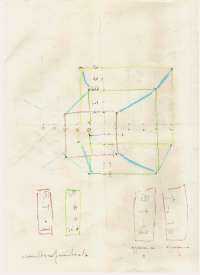RELATIVE MUSIC An unrealized economy, by Augustin Maurs À propos unrealized projects, it could be amusing to consider that, in the perspective of Albert Einstein's theory of relativity, almost the totality of the music written in the western cultures from Monteverdi to Charles Ives, from Schubert to Brian Ferneyhough is literally speaking unrealizable. Conceived as the simultaneous interaction of synchronized voices and musicians, this music is based on the idea of a single and absolute time frame. Now, not only this perception of time and simultaneity were famously revoked by the theory of relativity, but interestingly, the more we historically approached the moment where the concept of simultaneity was contradicted - at the beginning of the 20th century, the more western composers continued to extrapolate on the idea of an absolute time, thereby often making expansive use of mathematical tools… This cult of the absolute present remains today, while only the erring reality of musical practice enables the fact that we know this music, as the same time violating its logic and carrying it into posterity. Music - a time process, can also be a process of several “times” , that comprehends events happening in several flows and situations, developing other kinds of junctions, intervals and behaviors. A "music of times" can for sure not be defined by given informations inside one time frame, but it can exist through coincident interactions happening between events born out of different continuities. It can define itself through collisions. The purpose of relative music is to apprehend this collisions, to look at them not as divergences, but as an unlimited variety of impulses that we can interpret, replicate or transform. If not "realized" yet (in both meanings of the word), relative music is more realizable than most music we are used to. Rejecting the borders of one single time frame, this music is spatial perforce. It doesn't need a stage. It is an economy. An economy of impulses. Impulses as units that can be wide, loud, translatable, platonic, narrow, red. Impulses as units that lead to other impulses. But most importantly, impulses as units that can die. An economy of units that can die, that is an economy which indifferently embraces transcendence and transience. “Relative musicians” can thus be composers, singers, cheese makers or politicians. They are primarily dealers of impulses, taking part in the same economy, operating as well as imitators or as producers.
RELATIVE MUSIC An unrealized economy, by Augustin Maurs À propos unrealized projects, it could be amusing to consider that, in the perspective of Albert Einstein's theory of relativity, almost the totality of the music written in the western cultures from Monteverdi to Charles Ives, from Schubert to Brian Ferneyhough is literally speaking unrealizable. Conceived as the simultaneous interaction of synchronized voices and musicians, this music is based on the idea of a single and absolute time frame. Now, not only this perception of time and simultaneity were famously revoked by the theory of relativity, but interestingly, the more we historically approached the moment where the concept of simultaneity was contradicted - at the beginning of the 20th century, the more western composers continued to extrapolate on the idea of an absolute time, thereby often making expansive use of mathematical tools… This cult of the absolute present remains today, while only the erring reality of musical practice enables the fact that we know this music, as the same time violating its logic and carrying it into posterity. Music - a time process, can also be a process of several “times” , that comprehends events happening in several flows and situations, developing other kinds of junctions, intervals and behaviors. A "music of times" can for sure not be defined by given informations inside one time frame, but it can exist through coincident interactions happening between events born out of different continuities. It can define itself through collisions. The purpose of relative music is to apprehend this collisions, to look at them not as divergences, but as an unlimited variety of impulses that we can interpret, replicate or transform. If not "realized" yet (in both meanings of the word), relative music is more realizable than most music we are used to. Rejecting the borders of one single time frame, this music is spatial perforce. It doesn't need a stage. It is an economy. An economy of impulses. Impulses as units that can be wide, loud, translatable, platonic, narrow, red. Impulses as units that lead to other impulses. But most importantly, impulses as units that can die. An economy of units that can die, that is an economy which indifferently embraces transcendence and transience. “Relative musicians” can thus be composers, singers, cheese makers or politicians. They are primarily dealers of impulses, taking part in the same economy, operating as well as imitators or as producers.
